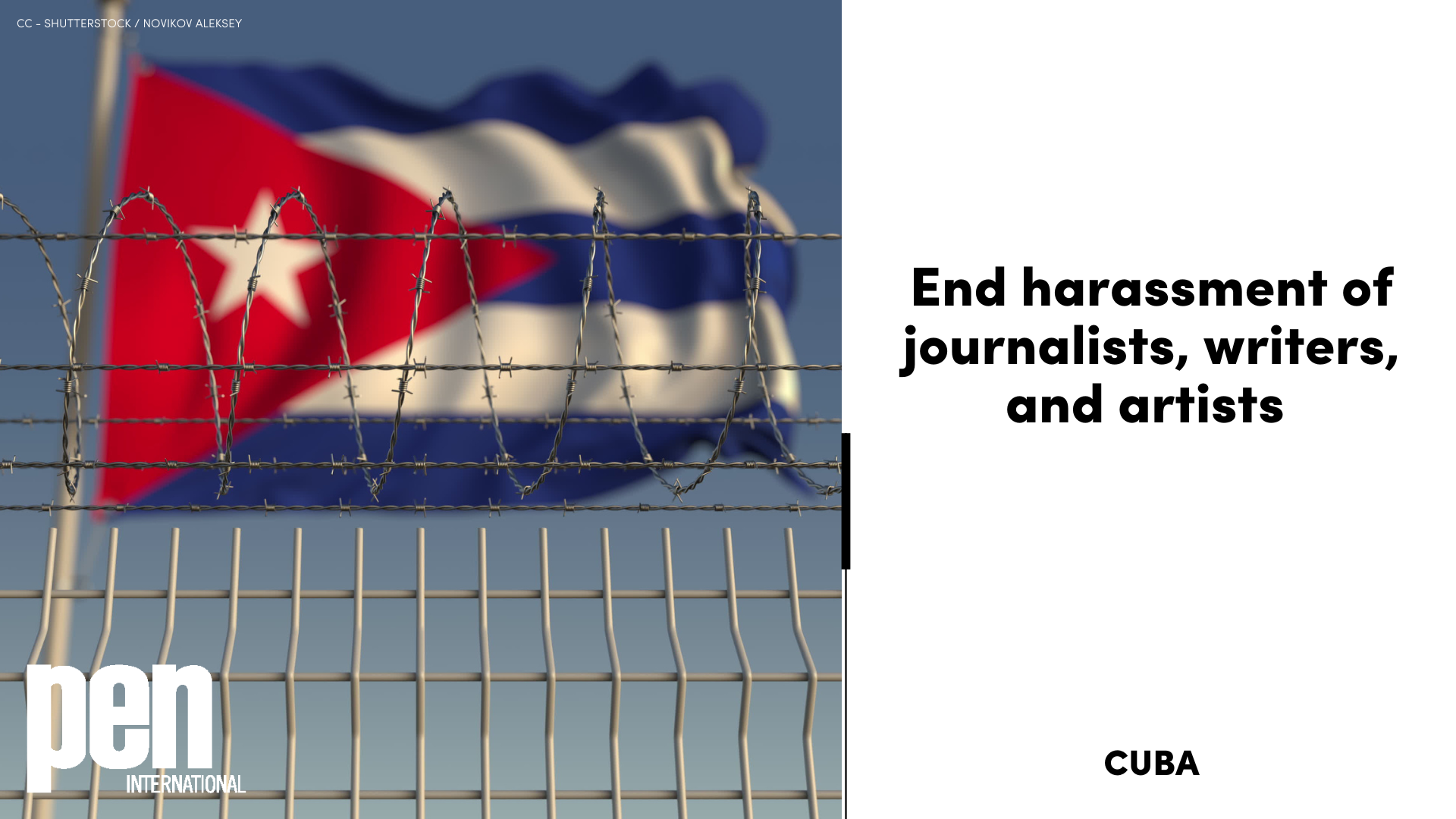Cuba: End harassment of journalists, writers, and artists
16 October 2024: PEN International, PEN Cuba Writers in Exile, and Artists at Risk Connection (ARC) denounce a new wave of attacks against independent voices. In recent weeks, journalists, artists, and writers have decried arbitrary arrests, harassment, and threats by authorities, signalling a pattern of censorship amid the passage of new laws limiting the exercise of free expression.
Recent repressive acts have occurred following the entering into force of the Law on Social Communication earlier this month, as well as Decree 101/2014 Regulation of the Law, and 102/2024 Regulation for the exercise of advertising and sponsorship, criticized by local, regional, and international media outlets and organizations.
The Law on Social Communication, along with the disproportionate use of criminal law, promotes the application of additional Penal Code offenses to target critical voices, charging them with crimes such as slander in "social networks" (Article 391), mercenaryism (Article 135), allegedly obtaining resources to pay for activities against state security (Article 143), or disobedience (Article 185).
Reporting from September 2024 documents a wave of repression against independent writers and artists. On 12 September, writer and academic Alina Bárbara López Hernández was expelled from the Union of Writers and Artists of Cuba (UNEAC) following a public post she made on social media about “internal information about the disciplinary process against me and [that] ‘offended’ a member of the organization.” According to her testimony, other grounds for her expulsion included “carrying out activities against the revolution,” “posts against the top leadership of the revolution,” and “showing solidarity with the July 11 movement.”
On 18 September, it was reported that Cuban academic and essayist Jenny Pantoja Torres was detained and released hours later, following police surveillance and threats from State Security and the National Police. That same day, writer and humorist Jorge Fernández Era, historian and author Alexander Hall Lujardo, and art critic and columnist Raymar Aguado Hernández, were summoned for questioning due to their social media posts, activism, and criticism of the authorities. Jorge Fernández Era was summoned by the Ministry of Security to its headquarters in Villa Marista, Havana. According to a post on his Facebook page, he spent nearly eight hours there, during which he was interrogated about his social media posts and threatened with legal action.
On the same day as Fernández Era’s interrogation, academics and activists Alexander Hall Lujardo and Raymar Aguado Hernández, members of the Socialists in Struggle collective, were also summoned by State Security for questioning. According to the digital outlet Periodismo de izquierda, Alexander, who also writes for elTOQUE, “intuits that in his case it is an interrogation as part of the raid against independent journalism currently being carried out by state security.”
PEN International, Artists At Risk Connection, and PEN Cuba in Exile call on the Cuban authorities to:
Cease all harassment and violence against critical voices.
Release artists and writers imprisoned for exercising their freedom of expression and peaceful assembly.
Repeal the Law on Social Communication due to its restrictive impact on the right to information and freedom of expression.
Relevant Context on Free Expression in Cuba:
Social Communication Law
On 4 October 2024, the Law on Social Communication came into force, along with Decree 101/2014 Regulation of the Law and 102/2024 Regulation for the exercise of advertising and sponsorship. The Law on Social Communication imposes extreme control over media, journalists, and public opinion. For instance, Article 13.1.2 prohibits published content from defaming, slandering, or insulting State authorities and from being used to "subvert the constitutional order and destabilize the socialist state of law and social justice". Media outlets that fail to comply face suspension, cancellation, or website removal. Meanwhile, the Institute of Information and Social Communication centralizes advertising decisions and content regulations.
Sustained harassment and forced exile of artists and writers
PEN International and ARC have documented harassment and silencing led by the Cuban government and aimed at limiting independent creative expression, in some cases, forcing individuals into exile. PEN International’s Case List 2023/2024, numerous releases, and ARC, PEN International, and Cubalex’s 2023 report Método Cuba: Independent Artists’ Testimonies of Forced Exile, explore the wide array of repressive tactics used by the government to delegitimise and marginalise dissident voices.
Note to Editors:
For more information, please contact Alicia Quiñones, Head of the Americas Region, at PEN International, email: [email protected]
For media queries, please contact Sabrina Tucci, PEN International Communications and Campaigns Manager, [email protected]

